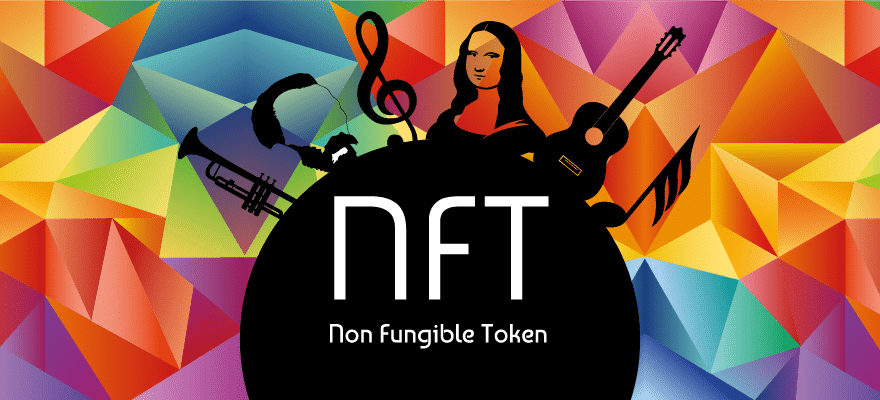In the realities of today's world social life is increasingly intertwined with innovative technologies. As a result, our life is changing, and most of people adapt to perceive and use innovations as a positive change. NFT technology has become one of the most talked about topics in the cyber community, and now it attracts the attention of people who are not involved in this industry at all.
What is NFT?
This abbreviation means non-fungible token. This name was adopted to denote a unique non-fungible digital key, represented by cryptocurrency.
Each digital token contains a certain amount of information that makes it unique. It is a kind of data container with the ability to move through the blockchain between addresses. In fact, NFT is a digital certificate confirming the ownership and uniqueness of the virtual object.
Each digital token contains a certain amount of information that makes it unique. It is a kind of data container with the ability to move through the blockchain between addresses. In fact, NFT is a digital certificate confirming the ownership and uniqueness of the virtual object.
It is important to understand that NFT has no effect on file copying. It only serves as a confirmation of ownership of a particular digital object. It cannot be destroyed or replaced with another token.
NFT technology allows you to buy or sell a digital object of any format, such as image, music, text, 3D model, game item, and so on.
Another important aspect is the very small size of the token in terms of storage. Not everyone can afford to download and store the entire blockchain. In most cases the NFT, requires to store only a few bytes of information, in the form of URL or a serial number.
To make it clear, lets say that a blockchain is a library with many books, then an NFT is like a piece of paper with a web address, password, or serial number written on it.
What NFT is not
First, it is not digital storage for media files. It is a misconception to believe that digital content is stored on the blockchain through NFT. The buyer of a song or image becomes the owner of a token that contains the URL of that very image or song. It can be hosted on the third-party web services.
Second, the NFT is not intended to discourage the deletion, alteration, copying or otherwise of any physical or digital objects referenced therein.
Third, NFT is not about granting ownership or copyrighting of a certain related assets.
Several factors that adds value to NFT:
1. Deploying the function when connected to an external system. Lets take the NBA Topshot project for an example. The value of the token in this case depends on the interaction with an external system to display the "sports moment" from the website. If, for some reason, the site stops working, then the value of the tokens will be canceled, since there will be no access to the service. In a similar way, NFTs could be converted into an application where they are destroyed after the physical item has been shipped.
2. The producer of a physical or digital object may sell legal rights along with the NFT. However, this does not guarantee that the seller has rights to these objects, and therefore the transfer of ownership must be formalized with a legally executed contract. As of today there is no legal link between NFT and digital rights of ownership.
3. Privacy / uniqueness of data. The NFT contains unique information that only the associated address has access to. And the purchase of a token is a way of obtaining this information, provided that the buyer is confident in its secrecy. In this case, it is a possibility that confidential information may have been previously disclosed by the previous owner or producer.
Fraudulent transactions involving NFT
There are several ways fraudsters can use NFT:
1. The NFT merchant who confirms the ownership of the related object is simply does not have the object.
2. NFT sold without actually securing the rights to the legally supported object.
3. The acquired NFT gives non-exclusive rights, that is, the author has launched several similar tokens on sale for owning one object.
4. Immediately after the implementation of the "collectible" NFT, the site to which it contains a link ceases to exist.
Because of those risks some people pay money for the thin air because they don't understand the features of the technology.
NFT Applications Today
There are many great examples of successful use of NFT. Among most popular projects are TopShot, CryptoPunks, CryptoKitties and some others. These are real operational examples of how applications / websites interact with the NFT when a site or game is used to prove ownership of a particular content.
NFT has considerable potential when it comes to projects selling in-game items. In this case, the developing company gets the opportunity to release game items with a certain remuneration rate (for example, 1%). At the same time, there is a guarantee of making a profit if there is a set trading volume or in the game purchasing volume.
Another use case for NFT is to give away gifts at social events. The case when tokens can be issued to visitors as evidence of their presence. There is a cases of selling e-tickets using tokens that cannot be directly scanned / cloned. And in the case of their resale on the secondary market, the owner receives royalties.
Of course, NFT has good potential in the field of confirmation of ownership of individual virtual assets or physical objects. However, legal issues still remain unresolved, which creates certain obstacles.
Unfortunately. the money is often laundered through NFT, because no one can prove that the buyer paid for some kind of "gibberish". In addition, the difference between the lower and upper limits of the NFT prices is sometimes very significant, and the prices are just being made up.
Telegram: https://t.me/deeptrd
https://app.aivia.io/ranking/136?a=VA9GZqD97
